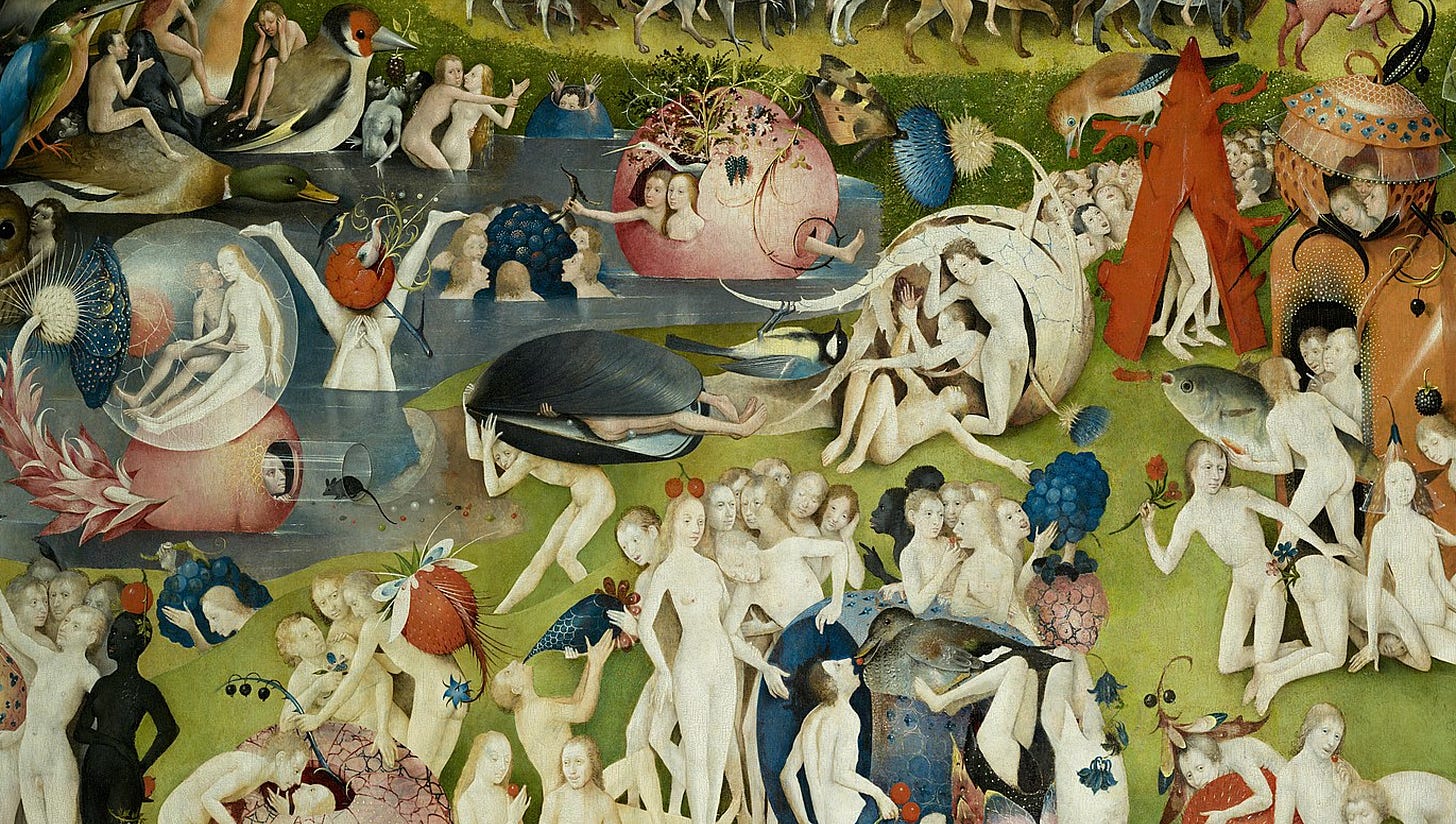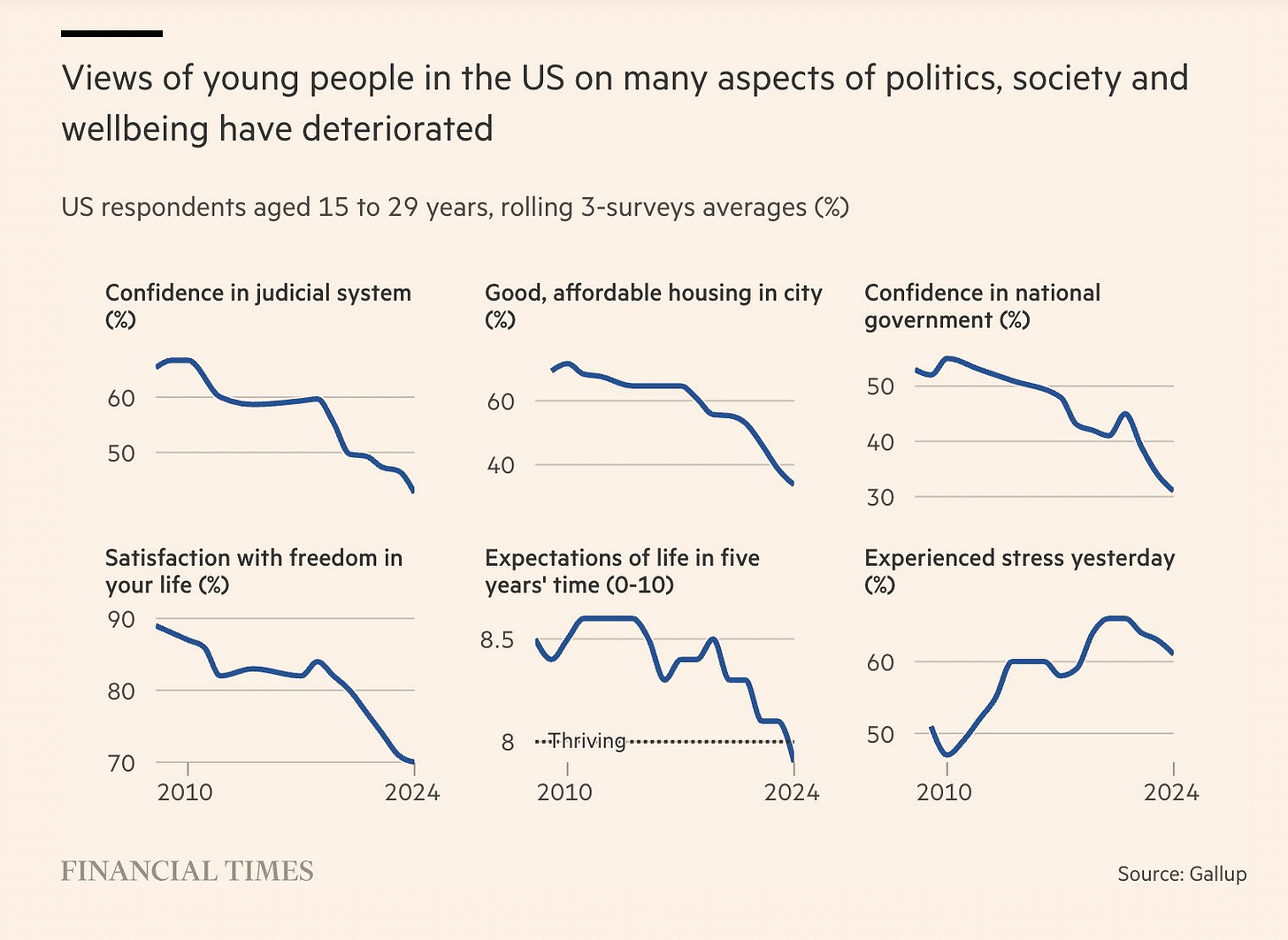“The old world is dying, and the new world struggles to be born: now is the time of monsters.” — Antonio Gramsci
Hieronymus Bosch’s The Garden of Earthly Delights sits in Madrid’s Museo del Prado. I saw it one gray February afternoon, the final day of my three weeks in the city. Flanked on both sides by a museum tour group, I studied the nude figures and hybrid animals contorted across the landscape: three gray corpses eating a giant blackberry from the mouth of a giant bird, a man dodging a kiss from a pig in a nun’s veil, a knight disemboweled by ferocious rodents, a woman gripped by two slimy dark arms. It made me think of the internet.
Like Bosch’s vision, the internet teems with grotesque little characters, all the Earthly creatures in eternal skirmish. The bot swarms, the wojaks, the memes of anthropomorphic frogs, the AI-sloppy, characteristically shiny videos of humans transmuting into peacocks and lions and wolves, the emoji-stuffed memecoin marketing. They prod, they provoke, they raise their pitchforks, rake each other over hot coals, dismember each other in the blue glow of their screens.
The grotesque emerged, literally, from the depths. As architecture historian Krista Mileva-Frank writes:
One day in 1480, a young boy walking along the Esquiline Hill in Rome stumbled and fell down a deep hole [...]and found himself—so the story goes—in a vast, many-chambered complex. Through the terror and musty darknesss, he made out strange, painted creatures dancing upon the walls: spindly acanthus scrolls foliating into men and beasts. [...] Early explorers understood it to be an underground palace or necropolis, and called its rooms grotte, a plural derivation of cropta, from the Latin crypta, meaning “hidden pit” or “cave”. They dubbed the peculiar paintings that graced its walls grottesche, or grotesques; the mysterious, hybrid creatures they represented became inextricably linked with the occult realm of the underground.
The grotesque is chthonic, liminal, peopled by creatures neither beast nor man—or both at once. Somewhere between nature and artifice, and yet in excess of both. The grottoes that came into vogue during the Renaissance, inspired by this subterranean find, reflected an ethos in which nature’s slow process of creation was completed and refined by the quick tools of man.
In breaking from the laws of nature via technical intervention, the grotesque invokes the mythic, ancestral time of gods and monsters. On the internet, too, the world becomes more primitive. A dreamworld, a nightmareworld. The gym-maxxing bros communicate in grunts, gooning and gambling at the crypto casino. Back to pure instinct, pure intuition. Literacy declines, thinking takes a back seat. Only the simplest narratives survive as shades of gray unwind back into blacks and whites. It’s good versus evil, woke versus based, the strong eat the weak, the hero’s journey, the grand deeds of great men. Out of this mythic space is born Mangione’s inalienable gesture. Out of this space tens of Teslas on fire. This is how the dreamworld works: lack of nuance calls for lack of nuance. You can’t argue with obliteration.
In The Tempest, Ariel the sea spirit evokes the grotesque in poetic form, misleading Ferdinand into believing his father’s body lies transmogrifying at the bottom of the sea. There’s slippage between truth and falsehood, life and death, narrative and reality:
Full fathom five thy father lies;
Of his bones are coral made;
Those are pearls that were his eyes:
Nothing of him that doth fade,
But doth suffer a sea-change
Into something rich and strange.
The grotesque is equal parts rich and strange, equal parts comic and horrifying. The brutish dreamworld breeds its own versions of heroes, vulgar, and of a ridiculous excess. On the internet, the men depict themselves with too much muscle, too much jawline, shirtless, yoked, and shining, against the backdrop of a galaxy sky. Accelerate, anon. It’s every man for himself and only the strong survive. Bronze Age Pervert, Andrew Tate, with their idolatrous hordes, are barbarians thinly veiled. Wolves wearing the skins of sheep, another grotesque contortion.
And yet, there’s a call to re-enchantment in the hero’s play native to this primordial, dreamy zone. It touches on the heart of something true: we have lost our connection to myth. We need to re-ensoul the world. Yet their manly yearning is regressive—a call back to Christian values, Make America Great Again. They are obsessed with ancient Rome, express their contempt for freedom of gender expression with cringeworthy fervor, lust for a society, a proper one, where they can seize their rightful place on top. The e/accs yearn for a superintelligent machine god, the Remilia horde speaks of networked spirituality, yet preaches violence and race science, Elon Musk memes himself into a Roman soldier. Just one problem with all this: the heroes of myth proved themselves worthy of respect and received it as willingly given. Our new heroes have not earned respect and yet demand it.
America is helmed by such self-proclaimed heroes; Trump and Musk are a couple of henchmen, visibly spiritually sick. Only empires in decline have spray tanned figureheads. The women of MAGA wear their sickness on their faces, their flesh cut up and stretched into a farcical interpretation of sex appeal. Donald Trump gives the Oval Office an equally garish makeover, complete with golden cherubs above the doorways for good luck. But a sick man cannot revive an ailing system with any amount of luck, nor even the backing of a million little hybrid creatures.
But all this spectacle is symptomatic of a deeper, systemic corruption. Jung writes of the Shadow, the part of ourselves we reject, then eventually lose touch with. So long as we ignore it, it will “direct our lives and we will call it fate.” Societies have shadows, too, and the dark side of the American Dream looks like violence, wealth inequality, labor exploitation, environmental degradation, systemic prejudice, technological dehumanization, individualistic narcissism, collective dissociation, and spiritual bankruptcy.
The cracks are widening, now, in the apparatus of American life, and the Shadow’s dark waters are seeping in. A generation raised on the promise of upward mobility faces increasing economic disempowerment, widening wealth inequality, and a cost of living crisis that renders basic stability unattainable. The future’s getting further out of reach. Material conditions are compounded by the isolating effects of digital life as technology platforms harvest attention for profit, while intensifying polarization and eroding social trust.
For young men in particular, the unraveling is felt more keenly. Emotional expression is discouraged, positive role models are scarce, and cultural narratives offer little beyond resentment or withdrawal. Like weeds that take root in toxic soil, it’s no wonder that grotesque figures like Tate and Trump flourish in this milieu of systemic malaise. They offer spiritually impoverished visions of strength and manhood, channeling disaffection into spectacle. The barbarians are at the gates. How delusional, that they style themselves in Romans’ clothing.
As the system comes apart it summons strange figures to the surface, mutant offspring of the Shadow. They gather steam in the buzzing mess of the internet, preying on collective vulnerability, collective dispossession. Careful, though, the dreamworld’s leaky these days. The monsters want their day in the sun.
Night now! Tell me, tell me, tell me, elm! Night night! Telmetale of stem or stone. Beside the rivering waters of, hitherandthithering waters of. Night!
— James Joyce, Finnegans Wake







This Terra Incognita is accelerationist offspring of Sexual Personae, Mysterium Coniunctionis & Finnegans Wake.